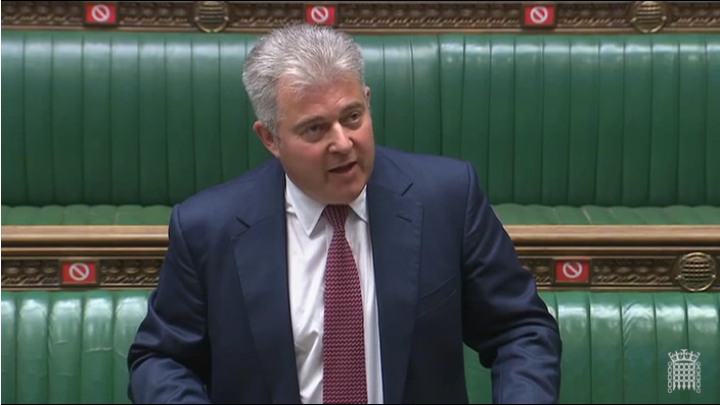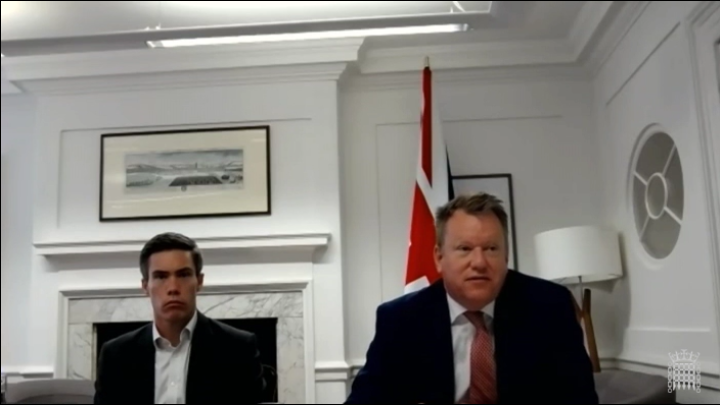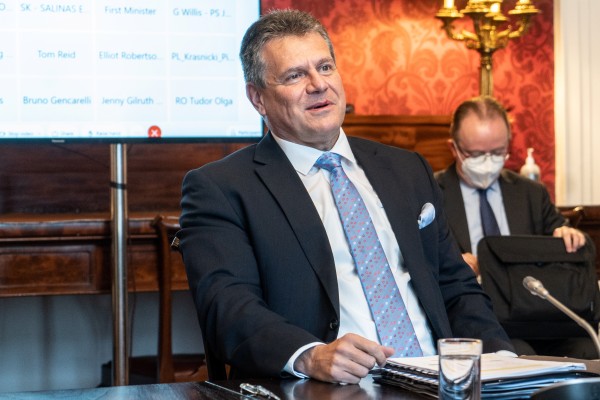Brexit & Beyond Newsletter
21 June 2021

Welcome to the 21 June 2021 newsletter
The UK Government has asked the European Union to agree to extending the grace period for chilled meats to enter Northern Ireland from Great Britain. Lord Frost gave evidence to the Northern Ireland Affairs Committee. Discussions on the UK’s post-Brexit trading and regulatory arrangements continue. The deadline for EU citizens to apply for ‘settled status’ in the UK is approaching on 30 June.
Protocol parley continues
Grace period
The UK Government has formally asked the European Commission to agree to extend the grace period for chilled meat preparations moving GB-NI which expires on 30 June. The Commission says it is assessing the request, noting its “openness to finding solutions in line with the Protocol” but “for that to happen, the UK must fully implement the Protocol”. The Commission will consult the European Parliament and Council, and Vice-President Maroš Šefčovič will reach out to Lord Frost, the UK’s Brexit Minister, to arrange a meeting.
House of Commons
In the House of Commons on Wednesday, Secretary of State for Northern Ireland Brandon Lewis responded to MP’s questions. Lewis told the Commons that the trader support service (which helps businesses with the new requirements of the Protocol) has created 1.8 million declarations, and supported nearly 700,000 consignments since January.

Secretary of State for Northern Ireland Brandon Lewis speaking in the Commons | Source: UK Parliament
Following this, Prime Minister Boris Johnson was asked by Sir Jeffrey Donaldson (DUP) if he can “confirm that the passing of the European Union (Withdrawal) Act 2018 and the Northern Ireland protocol that forms part of it, has not resulted in an implied repeal of article 6 of the Act of Union, which enables Northern Ireland to trade freely with the rest of this United Kingdom? Will he commit fully to restoring Northern Ireland’s place within the UK internal market?”. The PM said, “Yes, of course. I can give assurances on both counts. I can say that unless we see progress on the implementation of the protocol, which I think is currently totally disproportionate, then we will have to take the necessary steps to do exactly what the right hon. Gentleman says.”
His comment was picked up by commentators who note that Johnson’s comment contradicts the Government’s position in the ongoing legal challenge to the protocol, which is that if the protocol contradicts the Act of Union, the relevant part of this is implicitly repealed.
Foster's parting words
On Monday, former First Minister Arlene Foster gave a personal statement to the Assembly before she stepped down from the role. On Brexit, she said that “if Brussels continues to think that the protocol is enough, it is in denial. Imbalance and instability in the context of Northern Ireland is a truly dangerous cocktail. Northern Ireland is part of the United Kingdom and needs to be treated as such. If the EU does not do that, the UK will have a practical, political and moral obligation to act to protect the everyday life of everyone in Northern Ireland.”
Lord Frost appears before NI Affairs Committee
Lord Frost, the UK’s Brexit Minister, appeared before the Northern Ireland Affairs Committee on Wednesday. He was pressed by the Chair of the Committee to confirm that the UK Government negotiated the Protocol on Ireland/Northern Ireland with the EU, and that the position was understood. Frost stated, “Indeed. We have a clear understanding of the intention behind the protocol…it is a very delicately balanced set of provisions, with quite a lot of loose ends and open-ended provisions for subsequent negotiation.”
The Chair also questioned whether the “perpetual bubbling threat of the UK Government triggering Article 16” helps or hinders confidence and trust. Frost said that “All options remain on the table as regards the steps forward… There comes a point where the unsatisfactoriness of the current situation and the attempts to operate it in itself contributes to the uncertainty and instability, and then a responsible effort to bring stability and certainty can improve the situation, rather than make it more difficult. Obviously, if we judge that that’s the situation, then we look at the range of options that might bring further stability.”

Lord Frost giving evidence to the NI Affairs Committee | Source: UK Parliament
On the question of the constitutional integrity of Northern Ireland, Frost said, “The position of principle is clear: the protocol is 100% clear that nothing in it affects the territorial integrity or the state responsibilities of the UK.” He went on to quote Article 1 of the Protocol which states this principle.
The potential for a much-discussed veterinary or SPS agreement between the EU and UK was raised, which the EU says would reduce around 80% of checks at NI ports. Frost explained the Government’s objection to ‘dynamic alignment’ and preference for ‘equivalence’. Stephen Farry MP (Alliance) asked if Frost recognises that “if a decision was taken to align dynamically with the European Union rules, even on a temporary basis, that would be a sovereign decision for the UK Government to make?”. Frost said that it is not clear to him that the European Commission would agree to alignment “without some ability to police it through its institutions, which obviously would be even more unacceptable.” He said this “would be an abrogation of sovereignty”. He also stated that it is important for the UK to have control of its own rules for future trade agreements. RTÉ reports on the thinking in Brussels about whether this circle may be able to be squared.
Šefčovič on EU-UK relations
Vice-President of the European Commission Maroš Šefčovič spoke on EU-UK relations after Brexit at this year’s closing ceremony at the College of Europe in Bruges. A significant portion of his speech was dedicated to the new trading arrangements for Northern Ireland – the protocol. He said the UK “must now show unwavering commitment to the implementation of the Protocol, as opposed to continuously putting it into doubt.” He said it was a “major concession from the EU” to outsource control of its economic border to the UK and that “everyone around the table understood what these compromises meant in practice. The EU will not – and cannot – accept this delicate balance being unilaterally changed or disapplied because of buyer's remorse.”
On constitutional matters, Šefčovič said he is “acutely aware” of how some in NI feel about the Protocol but that “the Protocol has no impact whatsoever on the constitutional status of Northern Ireland.” Like Frost, he pointed to Article 1 of the Protocol, adding, “contrary to what some suggest, the EU has no interest in interfering in the UK's internal affairs.” He said he wished to see joint investment conferences to build confidence in the business community in NI, noting the “unparalleled access” the region has.

Maroš Šefčovič at last week’s meeting of the Joint Committee in London | Source: European Union
Frost said he had read Šefčovič’s speech with careful attention and tweeted that it is “thoughtful and interesting about our future relationship together even if of course we cannot agree with some of its fundamental assumptions about Brexit”.
UK trade and regulation strategy post-Brexit
Meanwhile, the Government has created a new Brexit Opportunities Unit within Cabinet Office and is recruiting a “visionary, inventive and dedicated leader” to support Frost in his work. The unit “will play a crucial role in setting the strategy for the Government’s ambitious approach to regulation, reviewing and reforming existing policy and regulation, and supporting the scrutiny and introduction of new regulation.” The team will be composed of “a wide range of experts from inside and outside of government”.
The Taskforce on Innovation, Growth and Regulatory Reform (TIGRR) has published its report on a new “bold” regulatory framework for the UK, regulatory reforms in high-growth sectors, and proposals for how these reforms could be achieved. Its authors state that they “appreciate that the Northern Ireland Protocol limits the scope for application of these reforms in that part of our country. We hope that future reform of the Protocol may allow greater scope for regulatory reform in Northern Ireland so that its economy can benefit from the proposals we set out.” The taskforce thinks that regulations can be a “significant driver” of the UK’s international competitiveness.
The UK Trade and Business Commission has urged the Government to increase funding for small businesses who have been “hit by post-Brexit red tape”. The Commission has recently been hearing evidence from small businesses, who warned that the new barriers were threatening the viability of their businesses. Hilary Benn MP co-chairs the Commission and said their testimony was “the clearest sign that our new trading relationship with Europe is not working for many small businesses.”
The UK Government last week announced it has secured a trade deal with Australia, its first ‘from scratch’ since leaving the EU. While a Downing Street official told Politico that “there is no interplay with wider issues” vis-à-vis a solution to NI’s trading arrangements, there are concerns that the trade deal risks undermining efforts on an SPS or veterinary agreement between the EU and UK.
Lords Sub-Committee rounds up initial inquiry on the Protocol
On Wednesday, the Lords Sub-Committee on the Protocol on Ireland/Northern Ireland spoke to community and civic society representatives on the impact of the Protocol. This was their final public evidence session before the report is published later in the month.
Louise Coyle, Director of the Northern Ireland Rural Women's Network, said there has been a failure to meaningfully engage with the community – she emphasised that women’s voices have been underrepresented. Coyle highlighted the importance of clear and unambiguous language, and noted issues arising from lack of honesty and clarity on the Protocol.
Dr Tom Kelly OBE, Columnist at the Irish News, noted the letter sent by then First Minister Arlene Foster and deputy First Minister Martin McGuinness in 2016. He asked when the UK and EU stopped listening to the special circumstances of Northern Ireland. He said it was a huge mistake not to maintain some form of the EU office in Belfast so that issues could be worked out on the ground. Kelly recommended that the Committee come to Northern Ireland to speak to people here, especially young people.
Jonathan Powell, former Chief of Staff to Prime Minister Tony Blair, said there were many causes of recent violence in Northern Ireland but that the issue of the protocol was “tinder lying on the ground waiting to be lit”. He said trust between the EU and UK has been badly undermined, particularly by the UK’s unilateral action which has increased the EU’s guard.
On Wednesday representatives of the Sub-Committee will meet with the Oireachtas Committee on European Union Affairs.
Citizens’ Rights
The EU-UK Specialised Committee on Citizens’ Rights met on Thursday via videoconference. The Committee monitors the implementation of the agreement on citizens’ rights (part of the Withdrawal Agreement), which protects the rights of UK nationals in the EU and EU citizens in the UK. In a joint statement, the UK Government and European Commission noted that the deadline for EU citizens to apply for ‘settled status’ in the UK ends on 30 June. There are also corresponding deadlines in France, Malta, Luxembourg and Latvia on the same date and the EU and UK encourages citizens to apply by these deadlines. Both the UK and EU highlighted concerns relating to applications for residence and other matters. The Committee is to meet again in September, where a 5th Joint Report on Residence will be discussed.
The UK Government has published a paper on local voting rights for EU citizens living in the UK. All EU citizens who have been living in the UK before 31 December 2020 will maintain their local voting and candidacy rights, if they retain lawful immigration status. For EU citizens who came to the UK after this points, their rights in this regard “will rest on the principle of a mutual grant of rights, through agreements with EU Member States”. The UK Government has already negotiated voting agreements with Spain, Portugal, Luxembourg and Poland.
The Commons Library has published a blog on the latest statistics on applications to the EU Settlement Scheme. The scheme registers EU, EEA and Swiss nationals living in the UK with ‘settled’ or ‘pre-settled’ status. By the end of May 2021, 5.6 million applications to the scheme had been received. 92,000 applications had been made in Northern Ireland by this date. An estimated 4,882,000 have received either settled or pre-settled status.
The Border People website contains further information about the system for Irish citizens who were not born in Northern Ireland: these citizens can apply for settled status but are not required to. Under the Common Travel Area, their right to live and work in the UK will be protected. However, there are additional protections under EU rules, such as having your non-EU family members live with you, which aren’t protected by the Common Travel Area.
Other news
- The European Parliament and European Council have agreed a preliminary deal on a €5 billion fund the ‘Brexit adjustment reserve’ to mitigate the effects of Brexit. This is a “one-off emergency instrument” and will be spent on compensating businesses for lost trade, helping fishing communities, and building customs facilities at ports. It will be allocated on three main factors: the value of fish caught in the UK exclusive economic zone, the importance of trade with the UK, and the population of maritime border regions with the UK. Ireland is set to receive the biggest share of the fund, with over €1 billion to be allocated to the country.
- Health Minister Robin Swann was asked in the NI Assembly on Monday about cross-border health services post-Brexit. He said that a number of service level agreements and memorandums of understanding are in place and that services which are already in place will continue. On the EU cross-border healthcare directive (CBHD), which allowed UK citizens to access healthcare in any EU country and be reimbursed for that in their home country, Swann said the directive no longer applies to the UK and transitional provisions have been made for reimbursements for up to one year. Swann has asked his officials to consider re-establishing a version of the directive for the Republic of Ireland. On dual registration, while there is no legislative alternative, there is an effective grace period and “there is no reason for any disruption to cross-border care”.
- The Centre for Cross Border Studies welcomes submissions in its second quarterly survey on conditions for North-South and East-West cooperation. It considers “the extent to which the necessary conditions for North-South cooperation are being maintained as the Protocol on Ireland/Northern Ireland is implemented, and how relations between the island of Ireland and Great Britain are operating.”
This Week at the Assembly
- Monday 21 June, 2pm – Plenary - Question Time – Agriculture, Environment and Rural Affairs
- Wednesday 23 June, 11am - Committee for The Economy - EU Exit legislation
- Wednesday 23 June, 3.15pm - Committee for Finance - Oral Evidence - Expert Advice on the NI Protocol: Generalists
- Thursday 24 June, 11.40am – Committee for Health - EU Exit legislation
- Thursday 24 June, 12.20pm – Committee for Agriculture, Environment and Rural Affairs - Written briefings from DAERA on EU Exit legislation
Catch up with the Committees
- Monday 14 June, 2PM - Question Time: Executive Office, Health
- Wednesday 16 June, 2.55PM - Committee on Procedures - Legislative Consent Motions - Associated actions
- Thursday 17 June, 2PM - Committee for Justice - EU Exit legislation



